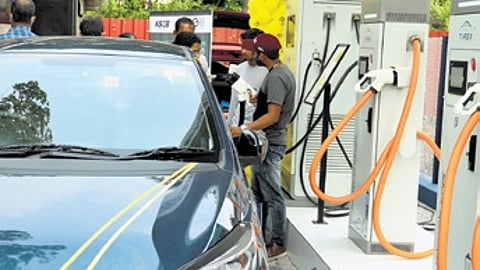Duty cut not to have major impact on local EV makers
NEW DELHI: Import duty concessions on completely built unit (CBU) electric cars will not have a major impact on local players even as the government via its updated EV policy is giving a massive tax benefit of about `16 lakh per unit on 40,000 electric vehicles (EV) over the next 5 years, according to a top carmaker, industry experts as well as the government
“It will help accelerate the EV ecosystem in India. Our Born Electric SUVs are on track to be launched in Jan 2025 with cutting-edge technology. Our products will speak for themselves,” said a Mahindra spokesperson. In the past, Mahindra and Tata Motors had advised the government not to lower import duty on EVs and protect domestic firms.
Siddhartha Bagri, CEO, Pravaig, a new-age e-carmaker, said the new EV policy undermines and underscores the contributions in capital, time and energy that millions of people, thousands of innovators and hundreds of companies have made in India over the last many decades. “To attract less than 0.1% of that contribution in terms of an investment into India, we believe a change in a significant policy like this will adversely impact sentiment of the Indian automotive ecosystem,” added Bagri.
Lowering import duty from 70% to 15% is seen as India’s step to attract global players, especially Tesla, to start manufacturing EVs in India. Billionaire Elon Musk’s Tesla in the past was lobbying to seek import duty cuts as they wanted to test the Indian market first before setting up a local factory.
A senior executive at a leading passenger vehicle company said the policy has been updated by keeping a particular carmaker (Tesla) in mind as its Model 3 is priced at around $35,000. “Tesla is a strong brand and may become the first choice of affluent EV enthusiast. However, India is a cost-conscious market at the share of cars priced above $35,000 is very small at 2.5%... In the long run, maybe, domestic players can face increased competition from global brands, especially in the premium segment,” the executive said requesting anonymity.
The government will now charge only 15% import duty on cars which have minimum cost, insurance and freight (CIF) value of $35,000, provided they meet investment criteria of $500 million and increase localisation to 50%. Currently, CBU cars priced at over $40,000 attract a 100% duty while those below $40,000 are subject to a 70% tax
Nawneet Vibhaw, Partner, Shardul Amarchand Mangaldas & Co, said the updated EV policy should not be seen as a deterrent for our incumbent domestic EV manufacturers at all as it will promote healthy competition among EV manufacturers in India and ensure better technology, cost-efficiency and overall quality. “Indian companies are already manufacturing vehicles which are great in quality and cost much lesser. More importantly there is a cap on the number of such vehicles which are allowed to be imported apart from several other conditions like the minimum investment requirement etc,” added Vibhaw.
Rajesh Kumar Singh, Secretary of DPIIT, said, “Our intention is not to cannibalise their (domestic players) market but to expand EV market by bringing in new players, give consumers the latest technology, kickstart transition to EVs by bringing in you know proven technology.”

